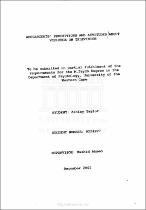| dc.description.abstract | The idea that television contributes to aggressive behaviour, and the argument that violence on television on may instigate aggressive behaviour, has been a heavily debated issue for many years. Most of the research done however , has been done in the area of the role that television violence has on influencing behaviour, rather than on how people who the behaviour is impacting on, perceive the violence television.
The aim of this study was to look at perceptions and attitudes adolescents have towards the violence that they exposed to on television. The present research aimed to find out what adolescents regarded as violence' what their attitudes, perceptions and knowledge was surrounding violence on television, whether they thought that television violence affected their interpersonal behaviour, and what solutions and strategies they imagined would be successful in combating violent behaviour. This study was done with a convenient sample comprising 25 adolescents who took part in four focus groups comprising 8 participants in 2 groups 9 in 1 group' and 7 in the other group. The participants were provided with a vignette depicting a violent incident and discussion was facilitated around what their perceptions were with regards to the vignette and televised violence. The data was then analysed through a process of thematic content analysis to identify the themes that gave an understanding of the participants belief television violence and perceptions with regards to television violence. Several possibilities emerged as explanations for the perceived limited effect television violence had on adolescents among, these being their ability to distinguish between fantasy and reality. The other primary reason that participants gave for the limited effect that television violence had on them was the fact that they were exposed to violence in their Iives on a daily basis, and that this has minimised the effect that television violence has furthermore the findings revealed that they saw violence as being primarily physical and that the main solution for them was individual responsibility and how the person perceives and interprets what they see. The main reason violence was seen as being primarily physical seemed to be the "graphicness" of violence that participants could see as opposed to more 'abstract' emotional or psychological violence which they could not see. To counteract violence, participants felt that the main solution lies in the individual taking responsibility foe his /her actions. | en_US |

